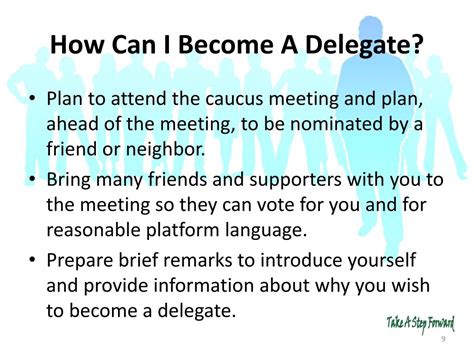How To Become A Delegate: A Comprehensive Guide
Becoming a delegate isn't a one-size-fits-all process. It depends heavily on the organization, group, or event for which you're aiming to become a delegate. This guide will break down the process, offering strategies applicable to various contexts, from political conventions to corporate meetings to international conferences.
Understanding the Delegate Role
Before diving into the "how," let's clarify "what." A delegate represents a specific group or constituency. This could be:
- A political party: Representing voters in a specific region or demographic at a party convention.
- A company or organization: Speaking on behalf of a department or branch at a company-wide meeting.
- A community or interest group: Advocating for specific issues or concerns at a larger gathering.
- A nation or state: Representing your country's interests in international negotiations or forums.
Your responsibilities will vary significantly based on this representation. You'll likely be involved in voting, participating in discussions, and potentially negotiating or advocating on behalf of those you represent.
Pathways to Becoming a Delegate:
The route to becoming a delegate is multifaceted and depends entirely on the context. Let's explore several common scenarios:
1. Political Conventions:
- Party Membership: Active involvement and membership within a political party is usually the first step.
- Local Involvement: Participate in local party meetings, volunteer for campaigns, and build relationships within your local party structure.
- Electoral Process: This often involves winning a local election or caucus to secure the nomination as a delegate. The specific process varies greatly by country and even state/province. Research your local party's rules and regulations.
- Petitioning: In some cases, you may need to gather signatures to qualify as a candidate for delegate.
2. Corporate or Organizational Meetings:
- Employee Status: Generally, you need to be an employee of the organization to be considered.
- Departmental Nomination: Your department may select delegates through internal voting or nomination processes.
- Seniority or Performance: In some cases, seniority or outstanding performance may influence selection.
3. Conferences and Conventions (Non-Political):
- Application Process: Many conferences have an application process where you submit your credentials and explain why you should be chosen.
- Membership in Relevant Organizations: Being a member of organizations related to the conference's theme often enhances your chances.
- Demonstrated Expertise: Showcase your knowledge and experience through publications, presentations, or other relevant achievements.
- Networking: Connecting with organizers and other attendees can significantly improve your chances.
4. International Delegations:
- Government Appointment: These positions are usually appointed by governments based on expertise and political standing.
- Specialized Knowledge: Expertise in relevant fields (e.g., diplomacy, international law) is crucial.
- Years of Experience: A proven track record of successful negotiations and international relations is essential.
Essential Skills for a Successful Delegate:
Regardless of the context, effective delegates possess several key skills:
- Strong Communication Skills: Articulating your views clearly and persuasively is vital.
- Negotiation and Diplomacy: Finding common ground and building consensus is crucial, especially in contentious situations.
- Active Listening: Understanding different perspectives is key to effective representation.
- Research and Analysis: Thorough understanding of the issues at hand is essential for effective advocacy.
- Leadership and Teamwork: Collaborating with others and potentially leading discussions effectively.
Key Takeaways:
Becoming a delegate requires proactive engagement, clear understanding of the specific requirements, and the development of essential skills. By following the strategies outlined above and focusing on your strengths, you can significantly increase your chances of being selected as a delegate and effectively representing your constituents. Remember to always research the specific rules and requirements for the organization or event you are aiming to represent.
